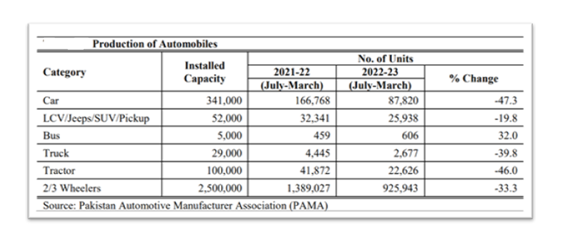INP-WealthPk
Ayesha Mudassar
Pakistan’s auto sector continues to struggle with significant challenges, making it difficult for manufacturers to contribute to the national economy. Secretary of the Auto Industry Development Committee (AIDC) Asim Ayaz said while talking to WealthPK that the automobile industry has taken a massive hit in the fiscal year 2022-23 owing to the exponential depreciation of Pakistani rupee, tighter monetary measures, and rising inflation. “The decision to continue import restrictions on completely knocked-down (CKD) kits has proven damaging for the industry,” he said. “The cumulative impact of these factors, along with weakened economic conditions, will further deteriorate the demand of the industry, and result in substantial revenue and job loss,” he lamented.
The auto industry was also facing challenges due to the upward revision of sales tax, capital value tax, and withholding tax rates. As per the Economic Survey of Pakistan 2022-23, the auto sector plunged by 42.4% during the first nine months (July-March) of FY23 against 53.7% growth last year. The production and sales of passenger cars witnessed a significant decline during July-March FY23, with production down by 47.3% to 87,820 units and sales down by 50% to 85,776 units, compared to 166,768 units and 172,612 units produced and sold during July-March FY22, respectively.
This decline in production and sales was observed across all segments of passenger cars and was primarily attributed to import restrictions that resulted in the non-availability of CKD units. Furthermore, the farm tractor sector experienced a significant decline during the period under review, with production and sales experiencing a downturn of 46% and 49%, respectively. The two/three wheelers sector also saw an unprecedented decline in production and sales, with a decrease of 33.3% and 33.0%, respectively. Notably, all units within the two/three-wheeler sector showed negative growth during the period, as they faced supply constraints of crucial parts.

As per data released by Pakistan Automotive Manufacturers Association (PAMA), a total of 96,812 units were sold during FY23, down 59 % against 234,180 units sold during FY22. High-interest rates and significant increases in auto prices due to rupee depreciation against the dollar negatively impacted auto sales. The current situation has put the auto industry in a challenging situation. To deal with all these issues, the relevant authorities have to look for out-of-box solutions. Prudent policies, political stability, streamlined import regulations, and harmonising trade relations with neighboring countries can play a crucial role in revitalising the auto sector.
Credit: INP-WealthPk




